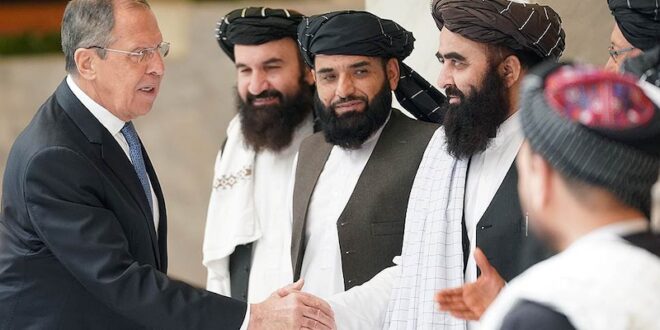The fall of Kabul in August 2021 prompted discussions about the end of Western influence in the country and an opportunity for China and Russia to dig their heels in the ‘graveyard of empires’. In the immediate aftermath, in contrast with Afghanistan’s other neighbours, Russia didn’t close its embassy in Kabul, with many Russian officials retaining a positive perception about what a Taliban rule could mean for Kabul as well as for Moscow.
While the baggage of history and the baggage of the present, i.e., the ongoing Ukraine crisis will weigh down on any Russian considerations with regard to Afghanistan, the coming months will see Moscow balancing its security and strategic interests in the region, along with attempts to expand its economic influence.
Russia in a post-US Afghanistan
This month, the Russian Ambassador to Afghanistan, Dmitry Zhirnov met Amir Khan Muttaqi, the Acting Foreign Minister of the Islamic Emirate in Kabul. As per the Islamic Emirate of Afghanistan’s (IEA) deputy spokesperson, the Ambassador briefed Muttaqi about the upcoming Moscow Format Consultations and invited him to the meeting. The Russian state news agency TASS skipped any reference to inviting the Taliban to the upcoming round of consultations and only mentioned that the two sides ‘touched upon’ the talks.
A few months after the Taliban takeover, Moscow called the third edition of the Moscow Format Consultations in October 2021. It saw participation from 10 regional countries and a delegation led by the Taliban representing Afghanistan. The invitation was not extended to the group in the next round of talks held in November 2022. All the participating countries pressured the group to form an inclusive government and respect human rights while also highlighting the need for regional cooperation to combat terrorism. Captain seats in these diplomatic high tables advance Russia’s interests by strengthening its position as a leader for the region. The explicit exclusion of the United States (US) or any of the Western countries from these consultations is aimed at consolidating a more regional approach to the crisis. The Taliban spokesperson’s assertion of receiving an invite from Moscow for the talks this year could be aimed at pre-emptively securing its place in the consultations when they happen.
Russia’s approach to the tectonic shift in the geopolitical landscape in Afghanistan was measured and pragmatic. Unlike most foreign embassies in Kabul, the Russian diplomatic mission wasn’t shut. Moscow also had warm words for the new Taliban establishment with Zhirnov acknowledging the dramatic fall in violence during a meeting with a Taliban representative within 48 hours of the takeover. These initial engagements were signalled to distinguish Russia’s response from those of the Western countries, refusing to toe the Western line of sanctioning and isolating the new regime. It strongly condemned the freeze on the assets of the Da Afghanistan Bank and called for their immediate release to stabilise the country. It also derided the sanctions for pushing the Afghan people on the edge.
Moscow’s initial overtures towards the Taliban not only stemmed from its enthusiasm about a NATO withdrawal from the country after 20 years but also because Russia has had a longstanding informal diplomatic relationship with the Taliban. Till 2011, Moscow provided logistical and intelligence support for the counterterrorism element of the War on Terror. Their engagement with the Taliban was also extremely limited till then. It was only when the Western powers expressed their inclination to taper their involvement in the country by 2011 that Russia considered engaging with the group. Owing to its concerns about terrorism and the mutual threat of a rise in ISKP’s capabilities, Moscow erected communication channels with the Taliban in 2015. Some American intelligence reports alleged that Russian weapons were smuggled to the Taliban across the Tajik border under the guise of fighting ISIS and al-Qaeda.
Afghanistan’s geostrategic importance for Russia
In its Foreign Policy Doctrine released in March 2023, Moscow outlined its intention to integrate Afghanistan into the Eurasian space for cooperation. This reference, while broad in its articulation, highlights Russia’s desire to co-opt Afghanistan under its strategic sphere and the increased importance of the country in the aftermath of the crisis in Ukraine.
Afghanistan’s importance for Russia also stems from the demand for geography. As Kabul shares borders with the Central Asian Republics (CARs) which Moscow considers as being under its sphere of influence, any degree of instability in the country can have negative implications for the Kremlin. It is mainly concerned with the threat of an increased infiltration of terrorism and drugs inside its territory through the CARs. There are also economic interests as Afghanistan’s resources ranging from oil to gold and rare minerals remain untapped. Marred by sanctions, it sees Kabul as a potential trade partner. Taliban last year signed a provisional trade deal with Russia, its first major international economic deal, to get gasoline, gas, and wheat.
Russia’s reliance on the regional countries
For Russia, the past two years have brought forth myriad challenges. While the resurgence of the Taliban changed the situation in Russia’s eastern neighbourhood, its invasion of Ukraine transformed the status quo in Europe. As Moscow tries to navigate the unintended consequences of its aggression, the imposition of Western sanctions has exacerbated its energy vulnerabilities. Its growing dependency on Western energy markets compelled it to diversify and approach non-Western markets and ensure consolidation of its spheres of influence. As the cleavages between Washington and Moscow rise, this has become imperative.
The Russian Special Envoy for Afghanistan, Zamir Kabulov underscored the importance of the regionalists, i.e. India, China, Iran, Pakistan and the Central Asian Republics; countries which according to Moscow will help in the resolution of the crisis in an inclusive way as opposed to the exclusionary role of the US and its allies. This reference to working in coordination with the aforementioned countries has been reiterated multiple times by Russia. In suggesting the formulation of a regional approach, it wants to prioritise a consensus-based approach to prod the Taliban rulers in Afghanistan to do their bidding. Russia has been working with these countries in most of the regional consultations that it is a part of or hosts, including the Moscow Format, the Shanghai Cooperation Organisation (SCO) grouping, the Tunxi Initiative of the Neighbouring countries of Afghanistan, etc. This need to cooperate emerges from a realisation of their importance in enabling Russia to achieve its interests.
Irrespective of whether there is a convergence of Russia’s long-term interests in Afghanistan with China and Iran, all three countries have the common goal of reducing any remaining US influence in the region. They have been meeting regularly, along with Pakistan to discuss the situation in Afghanistan. All share mutual concerns about the threat of terrorism emanating from Afghanistan. In the aftermath of the US withdrawal, both Beijing and Moscow were expected to fill the vacuum in the country. The Chinese side has also welcomed Russia’s inclusion in the settlement of the issue in Afghanistan. Moscow and Tehran have been cooperating since the start of the peace process in 2018. Tehran and Moscow are also in the final stages of signing a comprehensive cooperation agreement. The growing convergence between Russia and Pakistan is also evident in the recently concluded consultations between the two sides in June where commitments to cooperate on the issues of terrorism, drug trafficking, and organised crime were expressed. Both sides also agreed to cooperate in resolving the Afghan issue in a recently concluded meeting between the Russian Deputy FM and Pakistan’s Minister of State and their representative to Afghanistan.
While Russia’s cooperation with New Delhi could be affected by differences over the extent of their engagement with the Taliban, the shared concerns about terrorism will aid in cooperation. The Indian National Security Advisor (NSA) Ajit Doval visited Moscow in February and met his counterpart Nikolay Patrushev as well as the Russian President, Vladimir Putin. Both sides agreed to cooperate with an emphasis on the need to intensify intelligence and security cooperation to deal with terror groups. The recently concluded virtual summit of the SCO did reflect the opportunities and challenges that the countries in the region will face moving forward.
For Russia, Afghanistan will remain a strategic dilemma in the near future. While it will continue with its dual approach with the Taliban, its concerns about the terror threat will keep Moscow on its toes. Even though it has been urging the Taliban like the rest of the international community, to form an ethnically inclusive government, it doesn’t see the lack of recognition as a roadblock to have comprehensive cooperation with the group. Its efforts to cooperate with the other countries in the region and bypass any US involvement in a post-August 2021 scenario in the country will also continue but as most countries in the region do not have overlapping interests, reaching a regional consensus will be a difficult task. The Taliban, on the other hand, will seek Moscow out owing to their growing isolation, as was evident in the latest meeting between the Russian Ambassador and the Acting FM of the IEA.
 Eurasia Press & News
Eurasia Press & News



